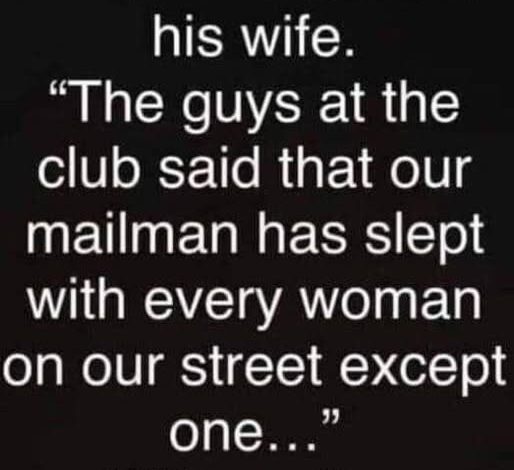
He Joked That the Mailman Slept With Every Woman on the Street, Except One
It began as an ordinary evening — quiet, predictable, comfortably dull in that long-married kind of way.
The TV murmured in the corner, replaying some sitcom they’d both seen a dozen times. The smell of roasted chicken lingered in the air. The kitchen clock ticked in steady rhythm, counting out another unremarkable day.
After twenty-three years of marriage, Tom and his wife had mastered the language of silence. They didn’t need words to fill every space. A raised eyebrow could mean “pass the salt” or “don’t push it.” A sigh could mean “I love you” or “you’re testing me.” That night, the air between them was easy — routine, unremarkable, domestic.
Tom stirred his coffee out of habit — black, no sugar — a ritual more about rhythm than need. Across the table, his wife was scrolling through her tablet, half-smiling at something on the screen. She looked relaxed, content.
And that’s when he decided to make a joke.
A small one. Harmless. The kind of throwaway remark that’s meant to tease, not sting.
He leaned back, watching her over the rim of his mug, and said casually, “You know, the guys at the club were saying the mailman’s slept with every woman on our street…”
He paused, savoring the setup.
“…except one.”
He expected the usual — an eye roll, maybe a sarcastic quip about how men gossip more than women. But she didn’t roll her eyes. She didn’t laugh. She didn’t even look up.
Instead, she lifted her wine glass, gave it a slow, deliberate swirl, and said evenly, “Well, it must be that stuck-up Linda at number 14.”
Then she took a sip.
The silence that followed was absolute.
The Joke That Fell Like a Brick
For a few long seconds, Tom didn’t move. The clock ticked. The refrigerator hummed. His heart thudded in his ears.
He blinked once. Then again.
She was still calmly sipping her wine, her face unreadable. Not smiling. Not smirking. Just… neutral.
Was she joking?
He forced a laugh, too loud, too forced. “That’s funny,” he said, though his voice cracked on the word.
Her eyes met his briefly. “Is it?” she asked softly, before turning back to her plate.
Something in her tone — the composure, the weight behind the calm — unsettled him. It wasn’t defensive. It wasn’t flirty. It was something else entirely.
And for the first time in a long while, Tom didn’t know what his wife was thinking.
When Doubt Moves In
They finished dinner mostly in silence. It wasn’t the comfortable quiet they were used to — it was the kind that hums with unspoken questions.
Afterward, she washed dishes, humming faintly. He sat on the couch, pretending to watch TV, though his eyes never left the news ticker.
His mind was spinning. Had the mailman ever lingered too long on their porch? Had his wife smiled a little too brightly while signing for a package? He couldn’t remember. But suddenly, every memory seemed suspicious. Every laugh, every wave, every “good morning” replayed with new meaning.
The brain is cruel that way — it can take something ordinary and twist it into evidence.
The Next Morning
Tom noticed the mailman for the first time in years. His name was Jerry. Mid-forties, stocky, the kind of man who whistled while he worked.
“Morning, Tom!” Jerry called cheerfully, waving a bundle of envelopes.
“Morning,” Tom replied, forcing a smile.
Jerry handed over the mail, his grin wide and friendly. “Tell your lovely wife I said hello,” he added, with a wink that felt heavier than it probably was.
Tom’s stomach tightened. “Sure thing,” he said, his voice tighter than intended.
When the door closed, he stood for a long moment, staring at the letters in his hand. It was nothing, he told himself. Just neighborly banter. Still, something in him stayed knotted all day.
The Silence That Said Too Much
That evening, his wife was on the couch, curled up with a book. She looked peaceful again — too peaceful.
“How was your day?” she asked, not looking up.
“Fine. The usual.”
She nodded. “Good.”
He hesitated, then blurted, “About the other night… that joke.”
She glanced up, smiling faintly. “Oh, that? You’re not still thinking about it, are you?”
“Well,” he said, scratching his neck, “you caught me off guard.”
She chuckled softly. “Then maybe next time, you’ll think twice before joking about other people’s marriages.”
He smiled weakly. “So, it was just a joke then?”
She tilted her head, that same calm expression returning. “Of course it was.”
She turned a page. Conversation over.
And he believed her.
Almost.
The Mind Games of Marriage
Over the next week, he couldn’t shake it. Her tone. Her timing. The way she hadn’t missed a beat. It was the kind of delivery that only comes from someone who’s either telling the truth — or hiding it perfectly.
Was she teasing him? Getting even for the joke? Or was there something else under the surface — something she wasn’t saying?
It began to feel like a chess match he hadn’t realized he was playing.
He caught himself studying her in quiet moments — the way she hummed while cooking, the way she smiled when her phone buzzed. He hated himself for it, for the suspicion, for letting one offhand remark burrow this deep.
But he also couldn’t deny it — she’d shaken him awake.
The Wake-Up Call
That Sunday morning, she stood in the kitchen wearing his old T-shirt, humming softly as she flipped pancakes. He watched her for a moment — her hair pulled back messily, her movements effortless.
She turned, catching him watching her. “What?” she asked with a half-smile.
“Nothing,” he said. “You just… look nice.”
She smiled. “You should tell me that more often.”
It wasn’t an accusation. Just a fact.
And he realized then that maybe her comment — joke or not — wasn’t meant to hurt him. Maybe it was a reminder. That she was still there, still sharp, still capable of surprising him. That he’d stopped seeing her.
The Joke Becomes a Mirror
For the next few months, life settled back into rhythm. But Tom was different. He listened more. Not suspiciously — attentively. He noticed her again. The way she laughed with her whole face. The way she still danced when she thought no one was watching.
The mailman still waved every morning. Tom waved back now, grinning.
Sometimes, his wife would catch him smiling and say, “Still thinking about Linda at number 14?”
He’d laugh. “Always.”
It became their private joke — one born from tension but transformed into a spark.
The Anniversary Conversation
On their anniversary, they walked along the pier, hand in hand. The sunset painted the sky in soft gold.
“Can I ask you something?” Tom said.
“Always.”
“That night — the mailman thing. You were teasing, right?”
She smiled, looking out at the water. “Does it matter?”
He hesitated. “I guess not. But I still want to know.”
She turned to him, eyes warm but mischievous. “Tom, after twenty-three years, if I can still make you wonder… doesn’t that mean there’s still something left to wonder about?”
He laughed. “You’re impossible.”
“That’s why you married me,” she said, grinning.
And she wasn’t wrong.
The Punchline That Lasted
Years later, he’d tell that story at dinner parties — the joke, her reply, the silence that followed. Everyone would laugh. Someone would always say, “You married a clever woman.”
And Tom would nod, smiling quietly.
Because they were right.
Whether her line had been truth or mischief no longer mattered. What mattered was what it taught him — that love isn’t about certainty. It’s about curiosity. It’s about still being able to surprise each other, even after decades of knowing every habit, every flaw, every sigh.
He’d gone looking for a laugh that night. Instead, he found something better — a reminder that even the calmest relationships still have undercurrents, still have life, still have mystery.
And every now and then, when the mailman waved from the end of the driveway, Tom couldn’t help but grin.
Because in their house, like the mail, the best jokes always delivered.




